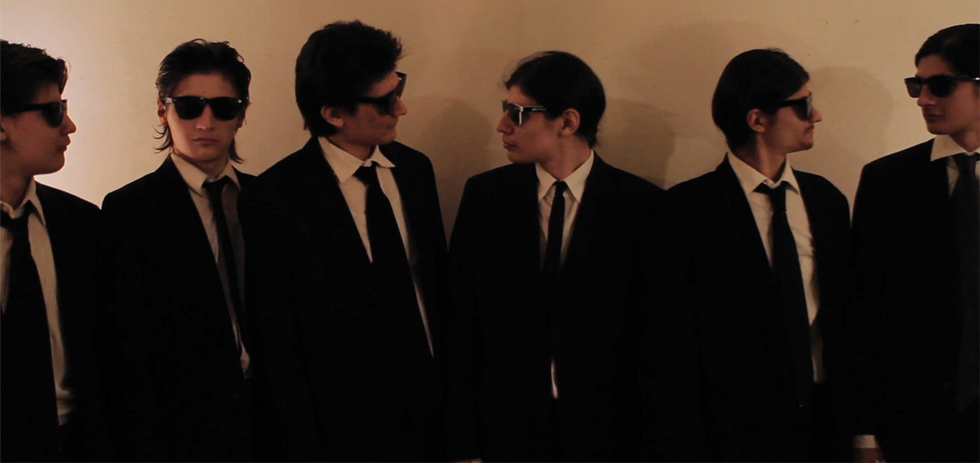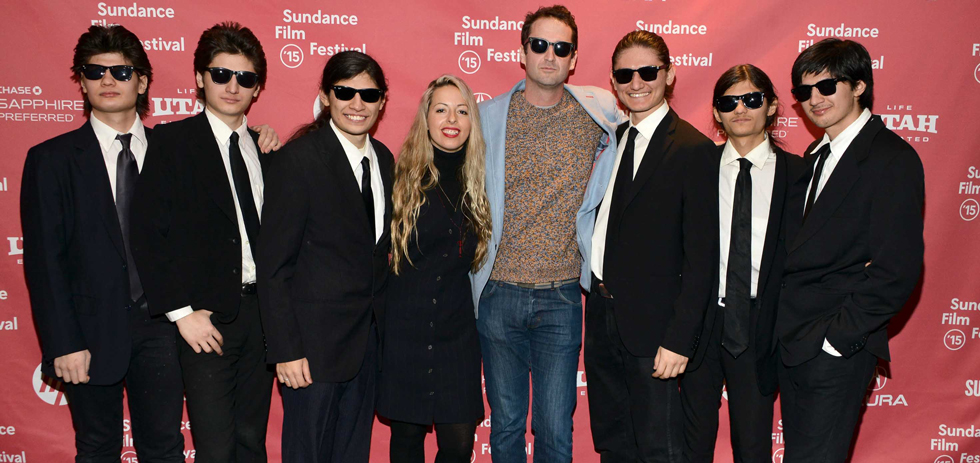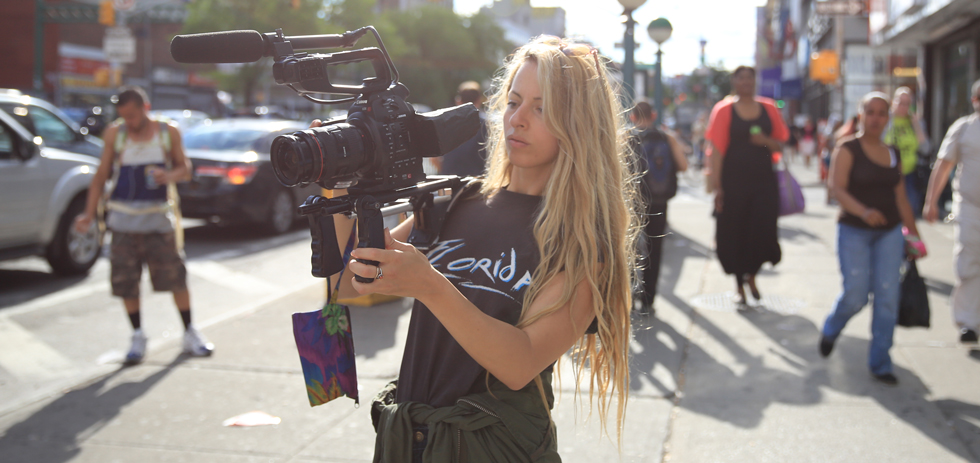Crystal Moselle’s The Wolfpack is one of this year’s most intriguing and enigmatic documentaries, telling the story of a group of siblings who spent most of their childhood cooped up in their apartment in New York City. The film has played to rave reviews at Sundance and Tribeca, and has screened locally at Sydney Film Festival and Melbourne International Film Festival. Whilst she was down in Melbourne during that festival, we were able to speak to Moselle about her film.
So I know the oft-written story of how you first saw the boys on the street and were instantly taken by them, but at what point did you decide, or perhaps realise, that you wanted to make a documentary about them?
I had early ideas of what it was gonna be, and I always wanted to do a documentary, it was more like what the documentary was going to be, something which was definitely found in the edit. It was just in pulling away all of these elements that I found what the film was going to be, you know?
I read that you shot the interviews in the film quite late in the process.
I started shooting interviews about two years into the process, and I shot for four-and-a-half years. I shot some here and there, but like serious, asking key questions stuff… I shot an interview with Govinda early but I didn’t shoot the dad until two years in.
So you had figured out by that point vaguely what the framework of the film was going to be?
Yeah, well I didn’t really know. I was just getting information here and there, I didn’t realise what the reality of their situation was for quite some time. Also, I was just so enamored by their creative side that I think that I wasn’t fishing for, like, a darker story, which it became.
The film is very well edited, in this non-linear, almost mosaic style, which means that you often can’t work out when you started filming it. Things pop up, focuses on characters and arcs – it left me wondering at the end when their re-enactments end and your film starts. Was that vagueness intentional on your part?
I think that we just threw out time as a rule, we figured that this wouldn’t work if we did it in a timeline because there are certain things you need to know and if you just do it in this way of ‘this happened then this happened’, you know, we need to actually understand this family before we bring them out into the world.
There are no intertitles or a voiceover, so you are playing with time in this unusual pseudo-verite way. It’s something of a jump from your other work – you’ve done a lot of commercials, as well as work with Spike Jonze, Pharrell Williams.
Yeah, I’ve done all of these different projects.
It’s a very eclectic filmography with a broad idea of art. Is that something which drew you to the boys? Their creative passion?
Yeah, we were all on the same wavelength, we were interested in the same thing – they want to be filmmakers and I was happy to help them all I could, give them connections and stuff.
Did you start out helping them on their shorts?
Yeah, I did. That was kind of the original idea, shooting a behind the scenes as they make their short film but, you know, the narrative changed. That wasn’t as interesting as the story of their family dynamic.

How much influence on their developing taste in movies? Did you suggest to them specific directors?
I might have. I think they say that I introduced them to documentaries.
Well, yeah – they’ve never re-enacted one of those.
Yeah. Then they were like “oh, documentaries are cool” and they asked me “have you seen Heart of Darkness?” and I was like “no, I haven’t seen it” and they gave that to me and I was like “woah”. Coppola really suffered for his art.
The last feature you were involved in, as far as I know, was Excavating Taylor Mead, which was about ten years ago. Was is it a strange experience for you to go back to Tribeca this year a decade after having been there in 2005 with that earlier film?
(Laughs) I didn’t even think about that. I think I was just building my voice as a director that first time and I’m still working on it. I shot Taylor Mead when I was in college, it was a totally different world. I learned a lot, I’m still learning.
It seems like there’s a vague parallel between the two films – both set in New York, lots of shots in apartments. You managed in this film to make their apartment feel like its own little world, which is what it must have felt like to them. At some points you even lose where you are inside the house. How much time did you spent with them outside of the house?
The boys? I don’t know, a lot.
As in, did you shoot the scenes of them on the beach or did they?
Oh yeah, we shot that. Most of the footage that’s present-day I shot, except for the scene where their mum talks to her mum.
You said in the post-screening Q&A here at MIFF that you had a mostly female crew. How did the family react to that, considering how male-dominated the household was?
I don’t know how they would really have changed because I didn’t have a point of reference, it probably made things more comfortable because their dad was mainly frightened of men coming into the house.
I imagine it had a positive impact on the mother in the house?
Yeah, I think so. I think their mum was definitely able to open up more, to have girl friends, you know.
Do you think that the boys, by realising that they were in a film and being filming, helped them gain a sense of confidence in the family’s strange power dynamic?
I think they already had the power. I think they took that power and they became the alpha males and that’s when I got there.
You got access to some home video footage as well, which makes for some of the most compelling, or at least unique, scenes in the film. The brothers are all remarkably articulate in it as well.
They read a lot, they’re not on the internet, they’re not swiping on Instagram, they’re not sending their brain in ten different directions every minute like the rest of us.
Were you not allowed to shoot scenes of their homeschooling or was the absence of that an editing decision?
I did shoot them being taught by their mother but it just didn’t make it into the cut.
It certainly was in the back of mind for the first half-hour in the film, their schooling and city laws in that regard.
It’s hard, it’s like when you’re telling a story you want to make sure that you leave everything in, and we had archival footage of their schooling as well but it just, I don’t know, I guess it wasn’t the most interesting footage that we had.
How did you go about financing the film?
I like financed the first three years myself, just working, and the first edit I paid for. Then I just felt at a loss because I knew I needed to get a new editor and, you know, take a different approach. So I starting knocking at like every door that I’ve had a contact with, I just used that card, basically with every single person I knew. I didn’t care, I was basically like “I need to figure out financing so I don’t have to work, so we can have an editor and be serious about this”. And that’s how I found Verisimilitude after a million production companies told me no.

Why do you think that the film has been such a huge success at festivals around the world?
Well it’s such a sensational story, the logline – I honestly thing it’s because of the logline. Then again, people are also expecting this really dark, negative story and realise it’s an uplifting story.
I’m guilty of that. When it started all I could really think about was Dogtooth. It ends up an often beautiful story about finding your own identity. As big film fans, how did they find it at the festivals like Tribeca and Sundance?
At Sundance… it’s like they were born to do this. They have a stage presence like none other, killing it – I’m so proud of them. They do way better interviews than I do, for sure.
Well one of them is now working in film, as a cinematographer?
Yeah, Govinda is a camera assistant who also does cinematography, they just all made a film for Vice called Mirror Heart.1 They were just in Hollywood, so they’re doing good.
Are any of them interested in making a documentary?
Narayana said that he might be interested in doing an activism documentary.
How long through the process did you realise that you wanted to end the film with the arc of their mother?
I feel like their mother’s arc was a real, true arc. The kids are going through puberty, they rebelled and went out into the world and changed their lives. Their mum, like, she was depressed, and wasn’t making her own decisions as an adult, and taking her power back. That, to me, made real sense and her kids gave her that.
And their father? Has he seen the film?
Yeah.
What does he think of it?
He think it’s educational to see his children and what they’re going through. He doesn’t get to talk to them [now].
When you started filming them, were they very open to having a camera crew in the house?
I mean, it started slowly, I mean I didn’t really know what their story was, they didn’t tell me, so it was just us talking about film.
Was it a small crew? Wait, was it just you at that point?
Yeah, it was just me but sometimes my friend Marissa would come.
Because of that level of intimacy would you say that the family depended on you for emotional support outside of the filming process?
Yeah, sometimes. I think that we trusted each other and most importantly they trusted me.
You’ve said previously that it was only a few years into filming that you realised the extent of the rules in their house. That would have been quite a shock.
Well yeah. One year, after 9/11, they didn’t go outside at all. Their dad was like “see – look how dangerous it is out there”. You know, they watched the towers come down from their window.
You said that you’re looking at making a narrative feature next. Is that going to be anything about a family structure?
Yeah, but not the same family. (Laughs) I can’t duplicate what I’ve done right. I’m still writing that one.
Thanks for taking the time to talk with me.
Thank you.
The Wolfpack will have a limited release in Sydney starting September 3.
